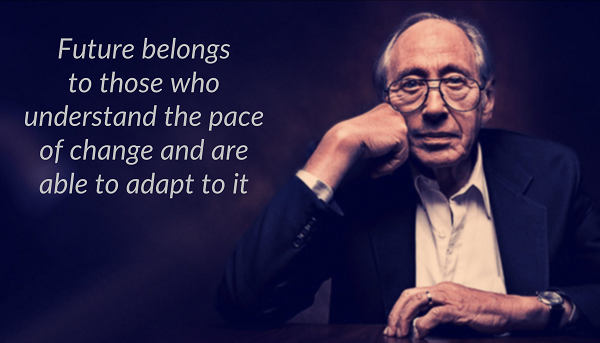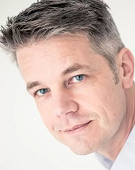The world is in a state of constant flux, a dynamic sequence of unpredictable events having a pace of change that is ever accelerating at an unbelievable rate. This transformation is driven by a multitude of factors, including technology, socio-political, demographics, and climate.
We experiment every day, on our skin, how much change can be challenging to navigate, which is often accompanied with a mix of feelings of uncertainty, fear, and stress.
The famous American writer, sociologist – and self-proclaimed Futurist – Alvin Toffler, in his seminal work Future Shock (1970), sharply explained the impact of rapid technological and social changes of his era.
He coined the term “future shock” for describing a traumatic state in which people fall, caused by their difficulty in adapting to these new realities happening at rapid speed and leaving them feeling disoriented, frightened, sometimes detached from their family and friendship networks.

Over fifty years since the publication of his book, modern human beings still struggle with similar concerns, actually emphasizing the enduring nature of certain human challenges over time.
It seems that the only way out for us, is to cope with it by not just merely surviving to these challenges – how depressing is to think this way – but, however, to accept – embrace – these changes by developing strategies that allow us and the organizations we inhabit, to thrive and prosper.
In this post, we will explore how Toffler’s advices (mental flexibility, continuous learning, creating support networks, and future vision) stick with us today than ever before and aligns completely with the cultural roots of any Agile Practitioner.
…well, we do have an advantage, don’t we?
Mental Flexibility
The first and most crucial strategy to manage change is to cultivate a flexible mindset. This means being able to adapt to new situations, learn new things, and change one’s opinions based on new information. To develop a flexible mindset, it’s essential to be curious, open to new experiences, and willing to step out of each ones’ comfort zone. It’s also crucial to think critically and evaluate information objectively.
Working in Agile Teams, actually, helps any members to embed this ability due to the nature of the – complex – problems they have to face: openness, courage, creativity and assertiveness need to be exercised every day, helping to develop a more flexible mindset.
Continuous Learning
In a world that’s always changing, it’s vital to keep up with the latest trends and technologies. This means continuously learning new things, both formally and informally.
In reality, to be effective, the process should be 1. Unlearn old things and 2. Learn new things.
Unlearning can be thought as the process of letting go of old beliefs, ideas, and behaviors that are no longer serving us; a difficult process that is essential for making space to learn new things and finally grow as a person.
Jurgen Appelo defined people who exhibit this behavior as Creative Workers; deviating, and not a little, from Peter Drucker’s definition of Knowledge Workers.
” In this century, there is less need to know things and more need to make things.
In the 21st century, there is little value in knowing how to use a tool: tools emerge and disappear faster and continuously.This century is for Creative Workers.
The ones who invest their time in experimentation and practice, while continuously updating and replacing their knowledge. ”
Creating Support Networks
Having a support networks of people who can help us overcome challenges is crucial in managing change. These networks can consist of friends, family, colleagues, mentors, or anyone else who can provide moral, emotional, or practical support.
We Agilists are used to rely on these networks that in our jargon we generically call Community of Pratice (CoP): group of people who “share a concern or a passion for something they do and learn how to do it better as they interact regularly.
Wenger, in his pioneering book Communities of Practice (1998), argued that communities of practice can be a powerful tool for people to learn new things, adapt to change, and make better sense of uncertainty.
Our personal experience is that, once the CoP is perceived as a safety space for its members, people are more incline to openly share their own concerns and even anxiety, creating the actual possibility to learn by each others’ experiences.
Future Vision
Future belongs to those who understand the pace of change and are able to adapt to it
Toffler’ quotes suggests we have to develop a sort of “magic” ability to envision the future, or at least imagine it. This ability is crucial in managing change because it allows us to prepare for what’s to come. Thinking strategically, identifying trends, being able to sensing the context around us, perceiving any possible weak signal, is crucial to adapt our plans to any unexpected changes.

Again here, the agile mindset, made of empiricism and rapid, iterative feedback, boosts this noble capacity of making hypothesis which can be rapidly tested and pursued or abandoned according to their correctness.
Conclusion
Ultimately, Toffler’s studies confirm that the speed of change in our societies, always anticipates our ability to know how to fully manage them: “The pace of change we are experiencing today will be the slowest we will experience in the rest of our lives”.
Change is an inevitable fact of life.
Give in to fear and uncertainty does not bring anywhere, while confronting it with more confidence and a quid of optimism, can make the difference.
He gifted us with some relevant strategies that can help us transform fear in strength to thrive in today’s world: developing a flexible mindset, continuously learning new things, creating support networks, and cultivating future vision.



